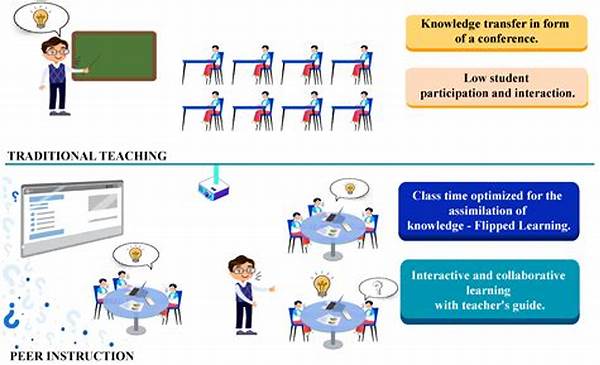Why Peer Teaching Reinforces Study Skills
Have you ever found yourself struggling to retain what you’ve read or studied during those long, solitary hours preparing for exams? You’re definitely not alone. It’s a common dilemma shared by students and learners of all ages. But what if there was a more effective way to enhance your study skills while also building confidence, communication abilities, and leadership qualities? Enter peer teaching—a powerful educational approach that not only addresses this issue but also transforms the learning experience.
Read More : How To Balance Study And Social Life In 2025
The Dynamic Duo: Learning and Teaching
Peer teaching, at its core, is an educational practice where students educate other students. Imagine being in a classroom where you not only absorb knowledge but also share it with your peers. It’s like hosting a fun study session where everyone participates and benefits. A little humor, a little gaul, and boom, you’re learning and reinforcing those study skills!
Research indicates that actively teaching others can improve retention rates by up to 90%. It’s a tried and tested methodology, rooted in the fact that teaching forces the teacher to thoroughly understand the material. This process of becoming a teacher, in turn, reinforces the student’s study skills far more than passive learning ever could.
Why Peer Teaching Reinforces Study Skills—A Fresh Perspective
When students teach their peers, they experience a multifaceted form of learning. They rehearse the material, conceptualize it in simpler terms, and present it cohesively. This method not only enhances their own understanding but also fosters a collaborative learning environment, where motivation and enthusiasm thrive.
More importantly, peer teaching builds empathy and communication skills. In the fine art of teaching, students learn to appreciate different perspectives, adapting their explanations to cater to diverse learning styles—skills that are vital not only in academia but in life. So, why not embrace this approach and watch your study skills soar?
Peer Teaching: A Game-Changer in Education
Educators love it because it transforms the classroom into an active learning hub. Students cherish it because they gain confidence and a sense of ownership over their learning journey. Peer teaching is not just a teaching method—it’s a game-changer for enhancing study skills and creating a vibrant educational community.
—
Exploring “Why Peer Teaching Reinforces Study Skills”
The Psychology of Learning Through Teaching
Imagine you’re in a room, explaining complex physics concepts to a friend. As you simplify and convey the information, your understanding grows deeper. Why is this? Simply put, teaching compels you to think critically, clarify doubts, and solidify concepts in a way that merely listening or reading never could. This, in essence, is how peer teaching reinforces study skills. It’s education meeting execution with a dash of creativity.
Peer teaching proves beneficial due to its inherent capability to engage multiple cognitive processes. The act of teaching requires you to recall knowledge, synthesize information, and tailor your communication to match your audience’s understanding—all critical components in mastering study skills. In an academic setting, this translates into higher retention rates, improved confidence, and a more engaging learning experience.
Benefits of Engaging in Peer Teaching
The beauty of peer teaching lies in its multidimensional benefits. Not only does it reinforce academic skills, but it also cultivates soft skills essential for personal and professional growth. For instance, educators have observed that students who engage in peer teaching exhibit improved critical thinking and problem-solving skills. They become adept at understanding concepts from multiple angles, preparing them for real-world challenges.
Moreover, the process of peer teaching fosters social interaction and a supportive learning environment. Picture a classroom where students are eagerly exchanging ideas, asking questions without hesitation, and working collaboratively to solve intriguing problems. This environment can dramatically boost a student’s confidence and willingness to take academic risks—core aspects of enhancing study skills.
Why Peer Teaching Reinforces Study Skills: The Testimonial
Consider this case: Jane, a shy, introverted student, reluctantly agreed to explain algebraic equations to her peer group. Initially anxious, she soon found herself enjoying the process. The feedback she received was overwhelmingly positive. Her peers understood better, and she felt more confident than ever before. Her newfound understanding of algebra was a testament to how peer teaching can powerfully reinforce study skills. Her story is not uncommon and illustrates why this method is advocated by educators worldwide.
—
Tags for “Why Peer Teaching Reinforces Study Skills”
—
Building a Foundation: The Impact of Peer Teaching
In the fast-paced world of education, there’s always a demand for innovative teaching methods that effectively train students for academic success. Peer teaching earns a gold star on this front. As Jane’s story illustrated, engaging in teaching others can significantly bolster understanding and retention of study material.
Investigation into why peer teaching reinforces study skills continues to highlight its relevance. Educators and learners consistently discover that peer teaching not only aligns with cognitive learning theories but also caters to varied learning styles. The beauty of it all? Everyone involved benefits, creating a holistic educational experience that extends beyond textbooks and exams.
Transforming the Classroom Experience
When discussing why peer teaching reinforces study skills, one must examine its impact on classroom dynamics. As students take on the roles of teachers, the traditional hierarchical structure shifts. Creatively, the classroom becomes a dynamic, buzzing community, where all participants contribute actively to learning objectives.
Not only does this shift promote a sense of responsibility among students, but it also encourages autonomy. Students take charge of their learning journey, an essential aspect of developing effective study habits. In classrooms where peer teaching is practiced, the increase in student engagement and motivation is stark.
—
Why Peer Teaching Reinforces Study Skills in the Modern Educational Landscape
Despite its proven benefits, peer teaching doesn’t always come easy. Change can be daunting, and students may initially feel skeptical about this approach. However, open communication with educators, continuous encouragement, and a focus on the unique advantages of peer instruction often dissolve these barriers.
Moreover, anecdotal evidence and statistical research support the method. According to a recent study conducted by a renowned educational institution, more than 75% of students reported improved understanding and retention of content taught through peer instruction.
This highlights a compelling case for educators and students alike to embrace peer teaching. The rewards are manifold—enhanced study skills, bolstered confidence, and a richer, more inclusive learning environment. So let’s take the plunge, foster innovation, and witness firsthand why peer teaching reinforces study skills.
The Growth Mindset: How to Initiate Peer Teaching
So, interested in experiencing the peer teaching magic for yourself? The first step is fostering a growth mindset. Encourage openness to new methods, actively solicit feedback and, most importantly, maintain a sense of curiosity and willingness to explore. The journey is as rewarding as the destination.
Ultimately, peer teaching has earned its place in modern education, offering a robust platform for reinforcing study skills. The real question is, are you ready to join the revolution? Dive into the world of peer teaching, and witness firsthand how it can revolutionize learning experiences, making education not only effective but immensely enjoyable.
—
10 Tips on How Peer Teaching Reinforces Study Skills
Effective Strategies to Maximize Peer Teaching Benefits
Understanding these strategies can help educators and students maximize the benefits of why peer teaching reinforces study skills. The process of teaching transforms participants into active learners, enhancing their comprehension and retention abilities.
—
Why Peer Teaching Reinforces Study Skills Through Emotional and Social Learning
Peer teaching doesn’t merely enrich study skills—it also nurtures emotional and social development. As students become educators, they develop empathy and improve interpersonal communication, essential skills for lifelong success.
In the realm of emotional learning, peer teaching encourages students to confront challenges, manage stress, and build resilience. It effectively prepares them to thrive not only in academic settings but also in the intricacies of life. Indeed, the method demonstrates how peer teaching reinforces study skills by intertwining cognitive and emotional growth.
—
Unleashing Potential: How to Initiate Peer Teaching
To embrace peer teaching, an open-minded approach is crucial. As you venture into this journey, remember to encourage creativity, welcome diverse ideas, and prioritize a collaborative spirit. Ultimately, the rewards far outweigh the challenges, highlighting why peer teaching reinforces study skills across various domains.
By understanding and harnessing the transformative power of peer teaching, educators and learners can revolutionize the educational landscape, making it more interactive, inclusive, and effective.


